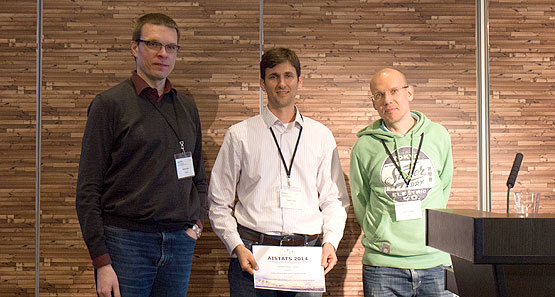Research in machine learning earns Notable Paper Award at AISTATS 2014
Prof. Scott’s research is in the field of machine learning, and his paper builds upon “supervised pattern classification.”

 Enlarge
Enlarge
Prof. Clay Scott and his co-author Gilles Blanchard (University of Potsdam) received a Notable Paper Award at the 2014 International Conference on Artificial Intelligence and Statistics (AISTATS) for their paper entitled Decontamination of Mutually Contaminated Models. The Notable Paper Award is the only paper award given by the conference; this was one of three papers chosen to receive this recognition.
Prof. Scott’s research is in the field of machine learning, and this paper builds upon a well-studied problem known as “supervised pattern classification.” In this problem, labeled examples of different classes of objects are observed, and the goal is to design an algorithm that generalizes to correctly classify future observations. Prof. Scott’s paper addresses the question of what happens when the labels provided to a classification algorithm are noisy. Such “weakly supervised” learning problems are increasingly common in the big data era, since in many applications ground truth labels are difficult to obtain.
The paper addresses the theoretical foundations of weakly supervised learning problems, and provides general conditions on the amount of label noise that can be overcome by a classification algorithm. While the work is theoretical, it has implications for a number of modern topics in machine learning including crowd sourcing (which relies on non-expert annotators to provide labels), topic modeling (the problem of extracting coherent topics from large collections of unlabeled documents), and nuclear particle classification (where ground truth labels are inaccessible because contaminating particles are always present in background radiation).
The paper appears in the Journal of Machine Learning Research: Workshop and Conference Proceedings, vol. 33.
 MENU
MENU